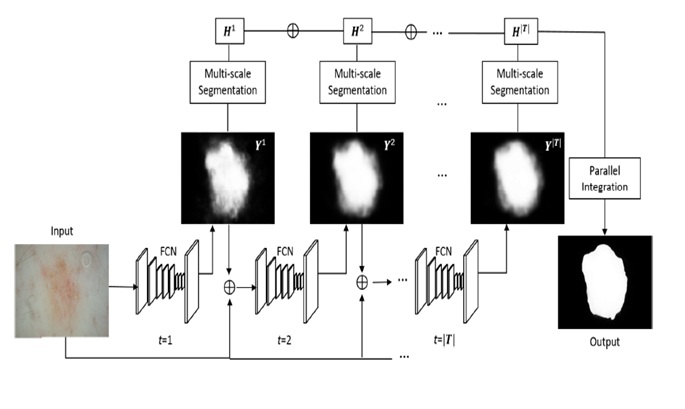- ALL COMPUTER, ELECTRONICS AND MECHANICAL COURSES AVAILABLE…. PROJECT GUIDANCE SINCE 2004. FOR FURTHER DETAILS CALL 9443117328


Projects > ELECTRONICS > 2017 > IEEE > DIGITAL IMAGE PROCESSING
Segmentation of skin lesions is an important step in the automated computer aided diagnosis (CAD) of melanoma. However, existing segmentation methods have a tendency to over- or under-segment the lesions and perform poorly when the lesions have fuzzy boundaries, low contrast with the background, inhomogeneous textures, or contain artifacts. Furthermore, the performance of these methods are heavily reliant on the appropriate tuning of a large number of parameters as well as the use of effective pre-processing techniques such as illumination correction and hair removal. Methods: We propose to leverage fully convolutional networks (FCNs) to automatically segment the skin lesions. FCNs are a neural network architecture that achieves object detection by hierarchically combining low-level appearance information with high-level semantic information. We address the issue of FCN producing coarse segmentation boundaries for challenging skin lesions (e.g., those with fuzzy boundaries and/or low difference in the textures between the foreground and the background) through a multi-stage segmentation approach in which multiple FCNs learn complementary visual characteristics of different skin lesions; early-stage FCNs learn coarse appearance and localization information while late-stage FCNs learn the subtle characteristics of the lesion boundaries. We also introduce a new parallel integration method to combine the complementary information derived from individual segmentation stages to achieve a final segmentation result that has accurate localization and well-defined lesion boundaries, even for the most challenging skin lesions.
Deformable Model, Nonâ€Uniform Illumination Correction, Hybrid Thresholding.
We propose a multi-stage FCN (mFCN) approach to train and to predict the segmentation in multiple stages and therefore minimized the segmentation errors for challenging skin lesions. During training, mFCN is capable of learning from both the training data (images and the manual annotations) and the estimated results derived from the previous mFCN stage. The ability to learn from previous stages has the advantage in not only boosting the training data but also in optimizing the learning of the lesion boundaries, which are usually difficult to segment. During prediction, mFCN uses dermoscopic images and the estimated probabilities derived from previous stage to iteratively and gradually improve the segmentation accuracy. We propose a parallel integration (PI) approach to further refine the segmentation of the skin lesion boundaries. We integrated the complementary segmentation results produced at individual stages of the mFCN to encourage agreement between the labels of neighboring pixels, which ensured that the appearance of segmented lesion was spatially consistent and resulted in better segmentation of the boundaries.
BLOCK DIAGRAM
